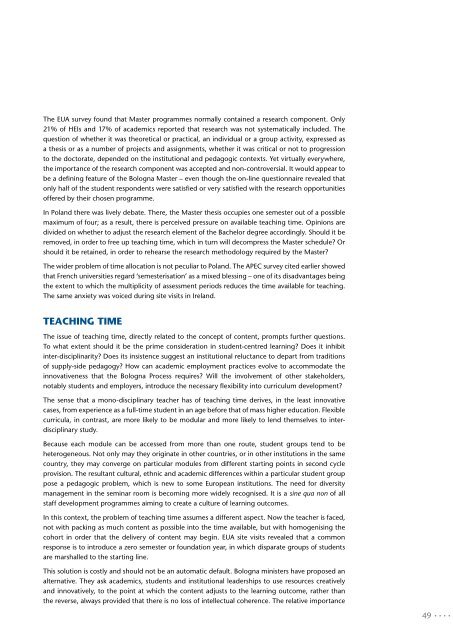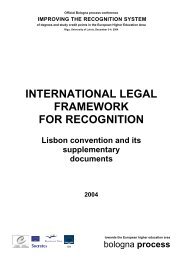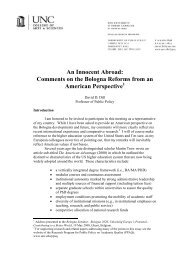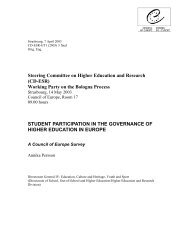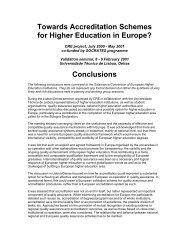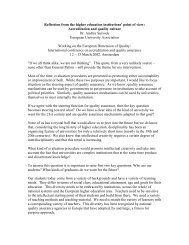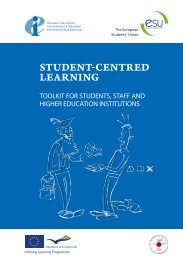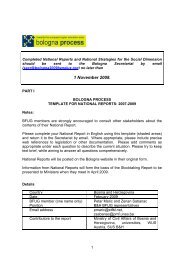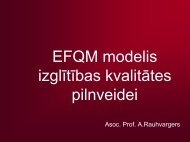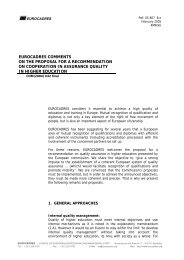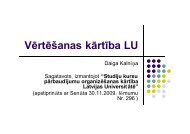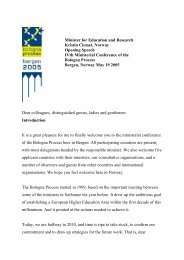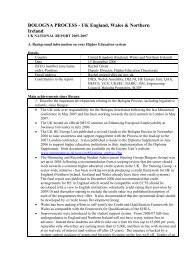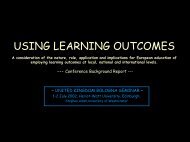EUA Survey Of Master Degrees In Europe - European University ...
EUA Survey Of Master Degrees In Europe - European University ...
EUA Survey Of Master Degrees In Europe - European University ...
You also want an ePaper? Increase the reach of your titles
YUMPU automatically turns print PDFs into web optimized ePapers that Google loves.
The <strong>EUA</strong> survey found that <strong>Master</strong> programmes normally contained a research component. Only21% of HEIs and 17% of academics reported that research was not systematically included. Thequestion of whether it was theoretical or practical, an individual or a group activity, expressed asa thesis or as a number of projects and assignments, whether it was critical or not to progressionto the doctorate, depended on the institutional and pedagogic contexts. Yet virtually everywhere,the importance of the research component was accepted and non-controversial. It would appear tobe a defining feature of the Bologna <strong>Master</strong> – even though the on-line questionnaire revealed thatonly half of the student respondents were satisfied or very satisfied with the research opportunitiesoffered by their chosen programme.<strong>In</strong> Poland there was lively debate. There, the <strong>Master</strong> thesis occupies one semester out of a possiblemaximum of four; as a result, there is perceived pressure on available teaching time. Opinions aredivided on whether to adjust the research element of the Bachelor degree accordingly. Should it beremoved, in order to free up teaching time, which in turn will decompress the <strong>Master</strong> schedule? Orshould it be retained, in order to rehearse the research methodology required by the <strong>Master</strong>?The wider problem of time allocation is not peculiar to Poland. The APEC survey cited earlier showedthat French universities regard ‘semesterisation’ as a mixed blessing – one of its disadvantages beingthe extent to which the multiplicity of assessment periods reduces the time available for teaching.The same anxiety was voiced during site visits in Ireland.Teaching timeThe issue of teaching time, directly related to the concept of content, prompts further questions.To what extent should it be the prime consideration in student-centred learning? Does it inhibitinter-disciplinarity? Does its insistence suggest an institutional reluctance to depart from traditionsof supply-side pedagogy? How can academic employment practices evolve to accommodate theinnovativeness that the Bologna Process requires? Will the involvement of other stakeholders,notably students and employers, introduce the necessary flexibility into curriculum development?The sense that a mono-disciplinary teacher has of teaching time derives, in the least innovativecases, from experience as a full-time student in an age before that of mass higher education. Flexiblecurricula, in contrast, are more likely to be modular and more likely to lend themselves to interdisciplinarystudy.Because each module can be accessed from more than one route, student groups tend to beheterogeneous. Not only may they originate in other countries, or in other institutions in the samecountry, they may converge on particular modules from different starting points in second cycleprovision. The resultant cultural, ethnic and academic differences within a particular student grouppose a pedagogic problem, which is new to some <strong>Europe</strong>an institutions. The need for diversitymanagement in the seminar room is becoming more widely recognised. It is a sine qua non of allstaff development programmes aiming to create a culture of learning outcomes.<strong>In</strong> this context, the problem of teaching time assumes a different aspect. Now the teacher is faced,not with packing as much content as possible into the time available, but with homogenising thecohort in order that the delivery of content may begin. <strong>EUA</strong> site visits revealed that a commonresponse is to introduce a zero semester or foundation year, in which disparate groups of studentsare marshalled to the starting line.This solution is costly and should not be an automatic default. Bologna ministers have proposed analternative. They ask academics, students and institutional leaderships to use resources creativelyand innovatively, to the point at which the content adjusts to the learning outcome, rather thanthe reverse, always provided that there is no loss of intellectual coherence. The relative importance49


